A Haitian immigrant reflects on memories of a damaged homeland but envisions a restored future
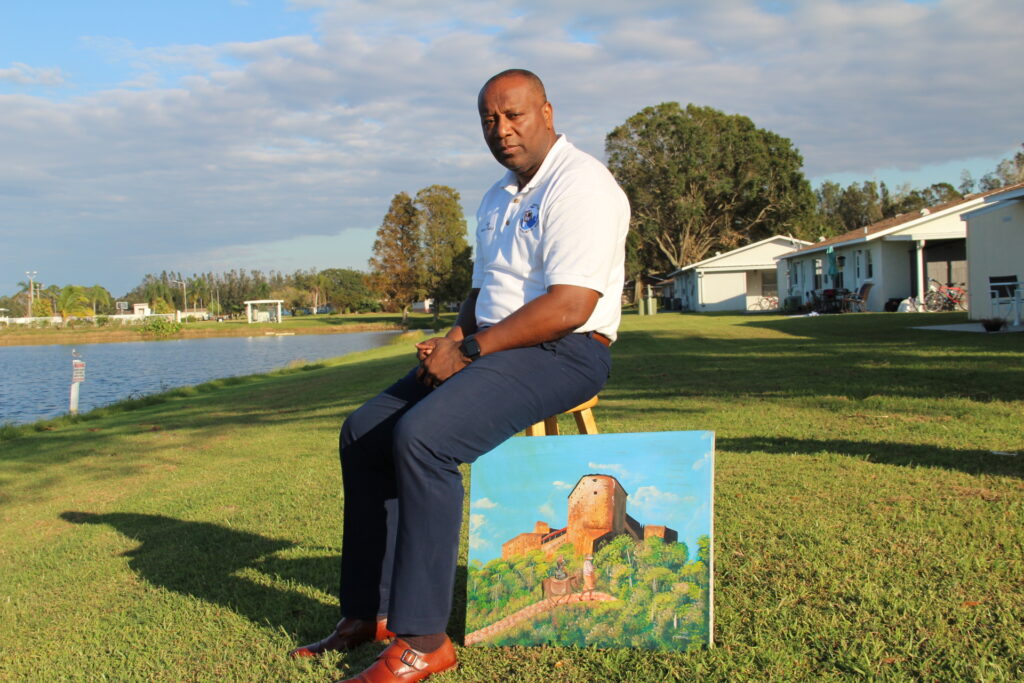
Guy Francois poses next to one of his favorite mementos of Haiti — a painting of the Citadelle Laferrière. The fortress is a famed icon of Haiti’s independence and revolutionary power. (Kylie Williams/Atrium)
March 29, 2023 | Story by Kylie Williams | Photos by Kylie Williams and courtesy of Bonnie Williams
The day Guy Francois’ sister was kidnapped dawned hot, humid and deceptively ordinary. It was the summer of 2007, and Francois was in his Palmetto career coaching office. Halfway through the workday, he got a phone call from his half sister, Luce. Francois picked it up and warmly greeted her.
“Hi, Guy,” she responded.
Luce’s voice sounded alarmingly off. Immediately, Francois knew something was wrong. Before she could say anything else, another voice came through the phone. Male, speaking in Haitian Creole:
“Don’t worry, your sister is fine. We have her in our custody.”
“What do you mean?” Francois’ confusion turned to horror.
“She’s been kidnapped. If you want her to be released, you’ll meet our ransom. We want $150,000.”
“But we don’t have that kind of money!”
“We know you have that kind of money. That’s what we want. If you want your sister alive, you are to send us the money.”
Francois recalls this memory in a smooth, calm voice, as if he were talking about a baseball game rather than his sister’s terrifying abduction. He sits in a tattered green armchair in my grandfather’s Bradenton home, telling his story to a rapt audience of three: myself, my mother and my grandfather. While we may be listening from the safety of a cozy living room 15 years later, a heavy feeling of danger seems to leak through the curtains with the sun.
Francois was born and raised in Haiti, a small island nation less than 1,000 miles southeast of Miami. He and my mother, Bonnie Williams, grew up in its capital, Port-au-Prince. My mother was an American missionary kid, called blan ayisyen — white Haitian — by native Haitians. She grew up scaling waterfalls and fidgeting in wooden pews, with many afternoons spent watching black-and-white television with Francois. The two now banter back and forth, slipping between English and Creole at a dizzying pace. Childhood friends reunited 40 years later.
Memories are passed around the room like dishes at a dinner table. Morsels of happiness, now out of place among Haiti’s current chaos. Inevitably, talk turns to those still within the country’s borders. Francois and my mother use apps like Facebook as a lifeline, communicating with friends who chose to stay. The messages tell a story of an apocalyptic state.
Port-au-Prince, a city whose streets once bustled with the sound of honking horns, is eerily empty. Ships carrying desperately needed supplies are stopped at the docks. Food sits rotting and stagnant in crates, while a nation starves. Citizens refuse to leave their homes, terrified of the gangs that roam the city.
While Haiti has been struggling for decades, its current crisis stems from events that happened two years ago. In 2021, the nation suffered both a 7.2 magnitude earthquake and a presidential assassination. President Jovenel Moïse’s murder created a power vacuum, allowing gangs to take control of the country. These gangs have wrapped around Haiti like a tourniquet, cutting off the lifeblood of food and supplies.
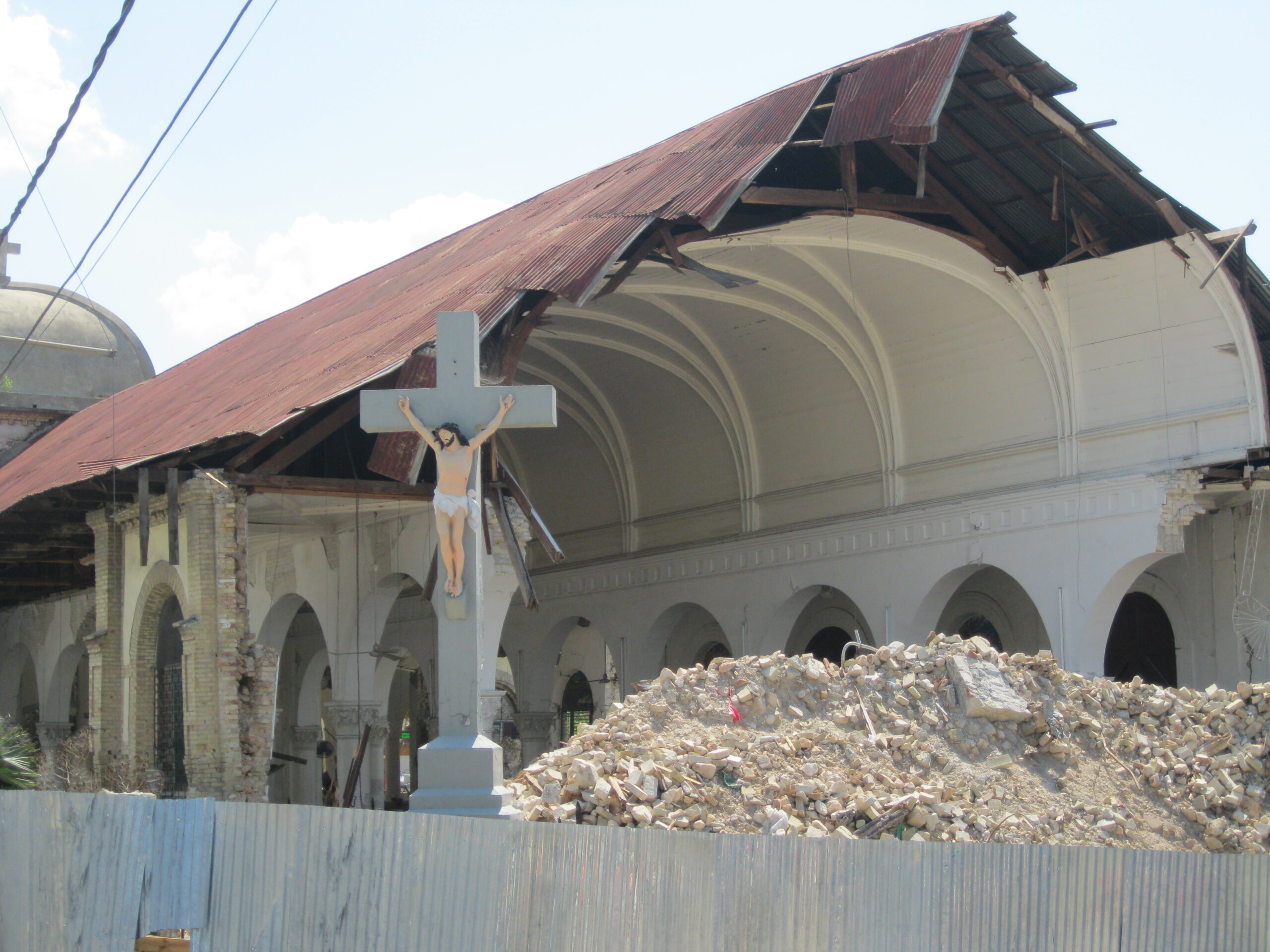
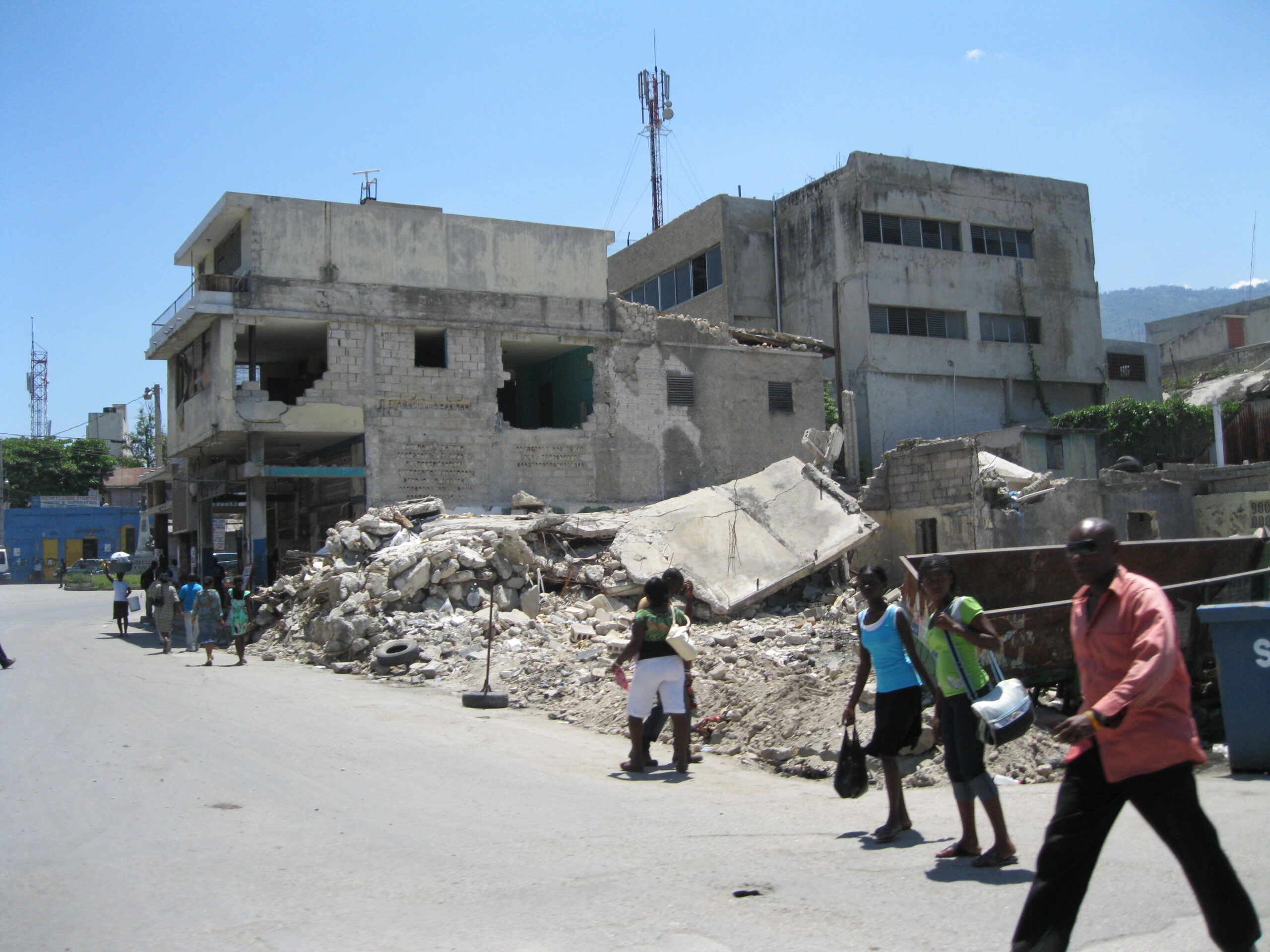
Buildings in Port-au-Prince were left destroyed after the 2010 earthquake. (Photo courtesy of Bonnie Williams)
Those who have the means to flee, do. Hundreds of thousands of Haitians have chosen to immigrate to America, almost half of whom now live in Florida. Francois himself arrived as a young adult in 1990, before Haiti’s situation became as dire as it is today.
Francois feels lucky to be here. The blessings come in small things, like reliable electricity and roads free of potholes. They shine in big things as well: food on the table, raising children in safety. Francois has never taken a bit of it for granted.
But he still has a strong love and appreciation for his home country. Francois has experienced the good that Haiti has to offer, the light from his childhood that still shines through the cracks of present darkness.
Playing outside with one of his 14 siblings. Plucking ripe mangoes from trees, fingers sticky with juice. Creole gospel songs reverberating through tiny churches. Francois’ childhood memories of Haiti are brimming with strong community and vibrant culture.
Francois keeps these moments close to his heart — especially now, when happy memories can easily get lost in his nation’s current suffering.
Fleeing chaos
Haiti used to be different, Francois says. His childhood memories are relatively peaceful and pleasant. Francois was born in Les Irois, a rural community on Haiti’s western tip. His family lived simply; instead of running water, they had a well. Rather than driving a car, they rode horses. There were no electric lamps or alarm clocks.
“You go to sleep early; you rise with the rooster,” as Francois puts it.
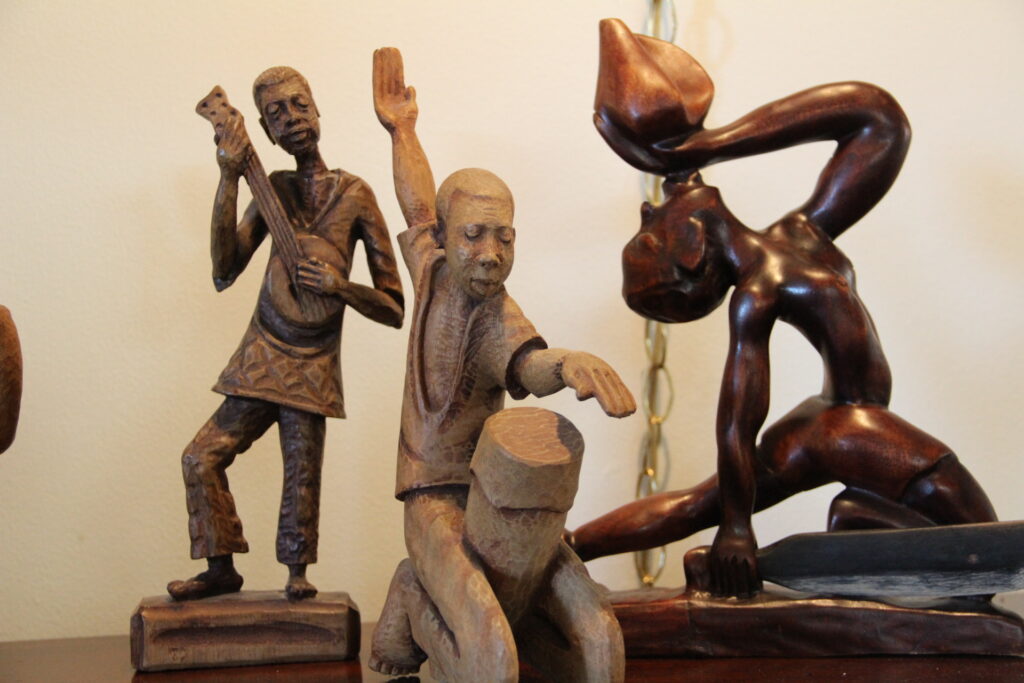
Three wooden sculptures of Haitian figures; the figure on the far right was gifted to the author by Francois. (Kylie Williams/Atrium)
Yet as Francois grew, so did civil unrest. Haiti had been under the rule of the authoritarian Duvalier dynasty since the 1950s. François Duvalier and his son Jean-Claude kept control of the nation using the brutal paramilitary force Tonton Macoute. In 1986, when Jean-Claude still held power, the nation revolted.
At the time of the coup, Francois was only 18, focused on school and friends rather than political revolutions. He had moved to Port-au-Prince at age 6 with his family. But Port-au-Prince had become an epicenter of madness. The city writhed with unrest and anger, overwhelmed with protests and cries for change. Francois frequently fell asleep to gunfire. Not a night passed without incident.
The coup made Francois’ father, Luc, realize it was time to flee Haiti. Luc was originally from Cuba, and he escaped the flames of its revolution in 1959. Now, the same fire was burning across Haiti. Luc was a visionary and knew he wanted his children to have more in life than he did.
“I don’t care how I live my life, but I want you to have a good life coming to the United States,” he would often tell them.
Luc immigrated alone to the United States soon after the events of 1986. In Palmetto, he worked grueling days in produce fields picking apples, tomatoes and oranges in the endless Florida heat. He sent nearly every penny he earned back to Haiti. The others went toward a fund that would support his family when they joined him in the United States.
It was October 14, 1990, when that day finally arrived. It was a jubilant day for Francois and his family, a day that felt like leaving all of Haiti’s turmoil behind.
The first thing they did in their new country?
“I went to KFC,” Francois said.
In the beginning, Francois missed his home. America was unfamiliar, nothing like the Hollywood movies. For a while, Francois debated moving back to Haiti. It only took a short trip back to Port-au-Prince for him to realize that was a mistake. Francois was 22, able-bodied and well-educated — but he didn’t even think of getting a job in Haiti. There was no opportunity for him, he said.
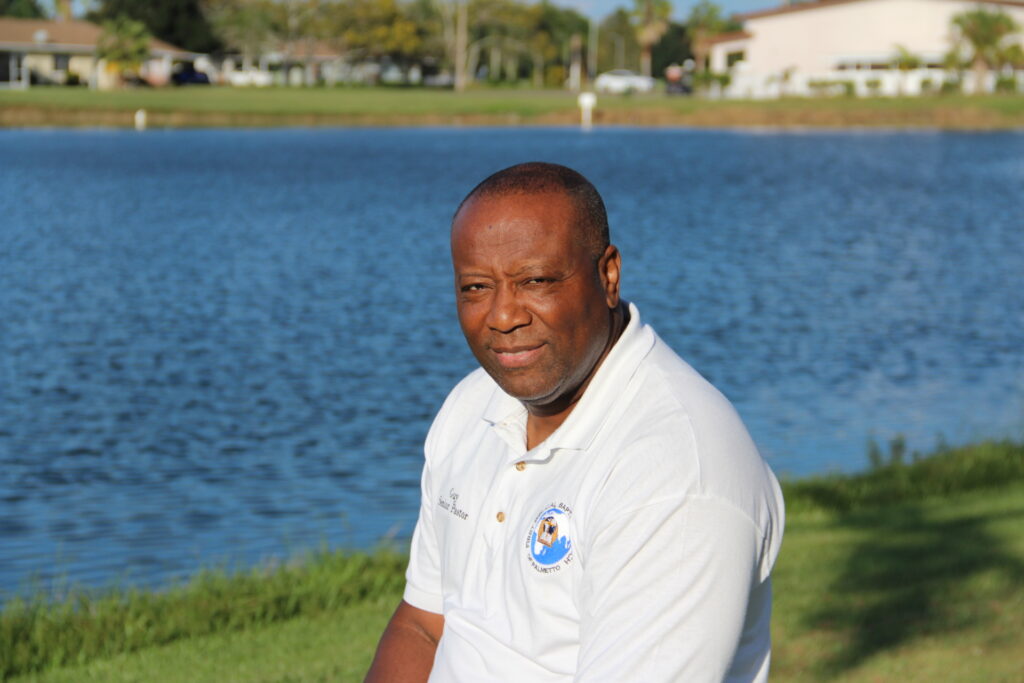
Francois, above, immigrated to the United States with his family when he was 22. He now lives in Palmetto and is married with four children. (Kylie Williams/Atrium)
After the chaos of Haiti, America was like the promised land for Francois’ family. Yet for many Haitian migrants, that promised land is nothing but a mirage.
The number of Haitian migrants has surged since the turmoil of 2021. Tens of thousands of Haitians gathered near the U.S.-Mexico border in September 2021, desperate to find security in the United States. The U.S. government forced thousands of these people back to Haiti.
While Francois might have been safer in America, he could never fully escape the struggles of his nation.
The summer of 2007 was a clear reminder of that. While Luce had been driving to work that morning in Haiti, an unknown gang had stopped her car and taken her hostage.
For Francois, the next few days became a desperate flurry of phone calls, bank trips and prayers. He called his father, the chief of the local police station and even the FBI. Francois can still recall the paralyzing panic from those days.
“They know what they’re doing,” Francois said. “They put this pressure on you, and you feel like, ‘I don’t want this person to die.’ And so we had to scramble … everywhere, call friends, call family.”
Francois focused on what he could do, working tirelessly with the FBI. At the FBI’s direction, he complied with the kidnappers, wiring thousands of dollars to Luce’s account. The gang sent Luce into the bank to withdraw the money while they waited outside.
“But usually when they do that, they collect the money, and they end up killing the person,” Francois said.
An employee at the bank realized Luce was in danger and brought her to a safe room.
Luce was free, and her kidnappers were arrested. Francois brought Luce back to the United States, where she still lives. She refused to leave the house for a long time afterward, the trauma overshadowing her safe reality. But she was able to raise her children in peace.
Others are not always so lucky. Haiti has the most kidnappings per capita in the entire world. People are often taken in broad daylight and killed when their families are unable to meet steep ransoms.
Yet while he might now be free of Haiti’s danger and struggles, Francois has never once forgotten his home country. Even 30 years after immigrating, he is still connected to Haiti. When Luce was kidnapped, that connection was used as a weapon. Like Francois, many Haitian Americans have felt the pain of watching the home they grew up in fall to chaos, every headline spelling out a new heartbreak.
But Francois’ connection to his home country has also inspired him to make a positive change. Francois created Project Light International in 2007, a nonprofit dedicated to helping Haitians. Even after Luce narrowly survived, Francois continued to return to Haiti every year before COVID-19.
Only three years after its founding, he would use Project Light to help rebuild his nation after a devastating blow. Haiti had weathered revolutions and chaos, but now the Earth itself seemed to want to destroy his home country.
Healing wounds
In 2010, a 7.0 magnitude earthquake shattered Haiti. The death toll numbered over 200,000, the United Nations estimates; over a million people were left injured or homeless. The epicenter was right outside Port-au-Prince.
Upon hearing the news in America, Francois was horrified. He immediately called Haitian friends to see what could be done. They gathered a team of workers, nurses and volunteers with Project Light. By working with other organizations, such as the local chapter of the Rotary Club, Francois secured a plane to take his team to Port-au-Prince.
When he landed, Francois was greeted with a nightmare. Multi-story buildings were reduced to bricks and dust. Dead bodies still lay mangled in the street. The stench of rotting flesh hung over the city in an inescapable haze.
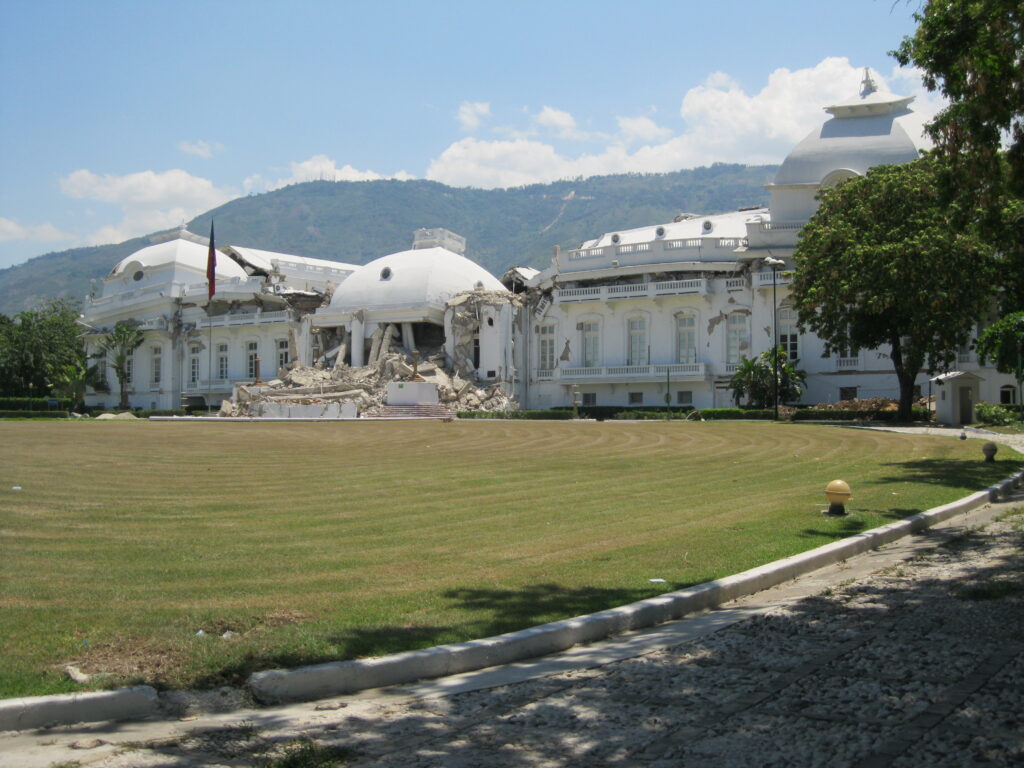
The National Palace, the president of Haiti’s official residence, was left partially crumbled after the earthquake. (Photo courtesy of Bonnie Williams)
Francois and the Project Light volunteers numbered among thousands of people aiding Haiti. They transported supplies to the rural parts of Haiti — parts of the country so remote that ambulances couldn’t reach them.
“There are some people who were kind of abandoned,” Francois said. “Not deliberately, but because there was not enough people to go to those places.”
Francois recalls several faces that he can’t forget years later: a mother who gave birth the day after the earthquake, laboring amid the wreckage of her city. Two young girls unable to find their parents, sitting injured with no attendants. And then there was Phillip, whose sister and wife attended Francois’ church. During the earthquake, Phillip’s wife and every one of his children died.
“That was very close to home, when we lost people that were very close to us,” Francois said. Francois was able to bring Phillip back to the United States, though he couldn’t heal his loss.
In Creole, there is a common phrase. Dégajé. In English, it essentially means to make do with what you have. Haiti has been battered and beaten, time after time. Many of its citizens wake each day devastated and terrified. When my mother talks of her childhood home, it is with a voice saturated in grief. She hasn’t been back to Port-au-Prince since the earthquake; her birthplace is no longer safe. She laments never having shown her children her house or her high school, immersing them in the culture she loves so dearly.
“I wish I could bring you to Haiti,” she has often said.
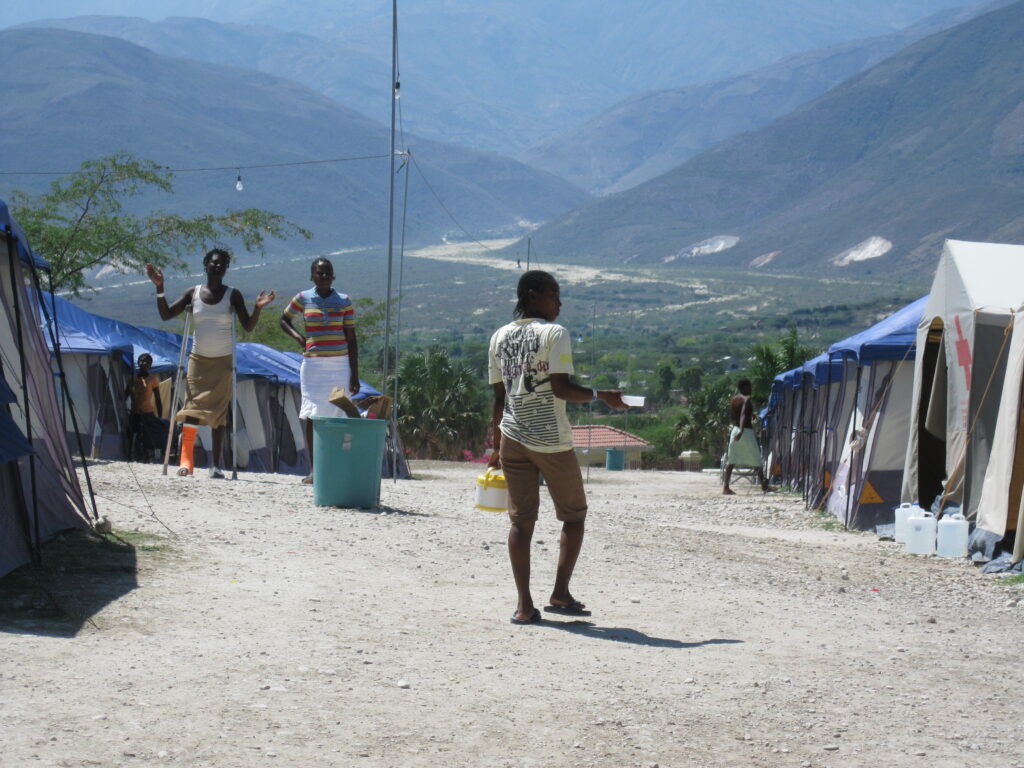
Haitians roam a city of tents set up inside Port-au-Prince. Thousands of people were left injured or homeless after the earthquake. (Photo courtesy of Bonnie Williams)
It is a difficult thing to watch a nation bleed, to see a people suffer so profoundly. Francois shares this grief — but for him, it’s braided with hope. He believes the nation he loves can heal, that Haiti can become a miracle.
“I think it just takes someone who is conscientious of Haiti and would decide to stand alone or to make the difference,” he said.
Francois is one of these people. In my grandfather’s living room, he presents me with a gift: a dark wooden figurine. A symbol of Haiti’s independence in 1804. Haiti was the first Black nation to gain their freedom, the world’s only successful slave uprising.
The statue lunges forward, blowing a conch shell like a trumpet, celebrating victory after oppression. Francois is determined for Haiti to find its own modern victory. Currently, Project Light International is working on raising funds to establish an emergency first responder management system in Haiti. The nonprofit also continues to sponsor an orphanage in the city of Saint-Marc.
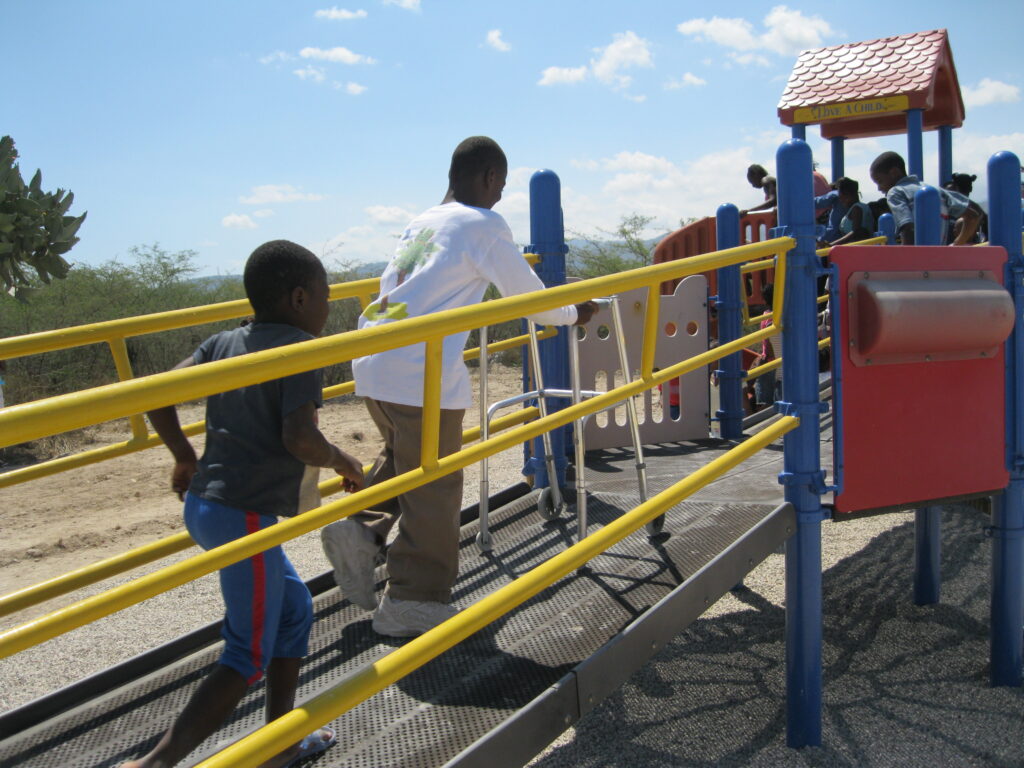
Haitian children test out a new playground post-earthquake. The author’s mother, Bonnie Williams, worked with volunteers from the organization Kids Around the World to build the playground in 2010. (Photo courtesy of Bonnie Williams)
Years ago, Francois’ father would sit him and his siblings down in their living room in Haiti. Every day, he would say: “I see far for you guys.”
Francois and his siblings would laugh and say to each other, “What is he talking about?” What future existed for them in Haiti? Now when he and his siblings gather, they say: “This is what he saw.” One sister is an attorney, another a teacher. Francois has a Ph.D. with a concentration in counseling. He balances being the senior pastor of the First Biblical Baptist Church of Palmetto with his full-time job as a career coach.

Now, Francois sits in another living room,
far from that of his childhood memories,
singing a Creole hymn with my family:
“What though the way be weary
And dark the shadows fall
I know the way he leads us
Our father planned it all.“
Their voices blend together in a warm harmony,
enough to elicit tears. It is a reminder of home,
a nod to current struggles. It is a vow of resilience. Dégajé.
Francois sings the hymn “My Father Planned It All” in Creole with the author’s mother and grandfather. (Kylie Williams/Atrium)